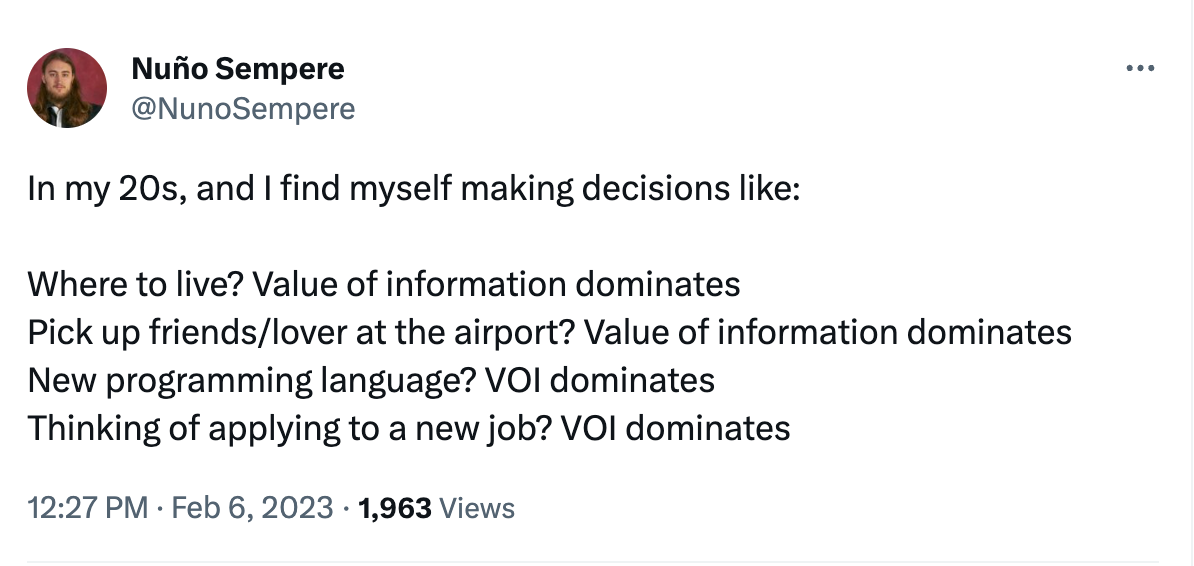Productivity Tips
[Make it easy to] just do the thing
[This is an aside from my usual weekly stories]
Productivity Tips
The other day at a conference somebody asked to chat about how I manage to be pretty productive. Other people have noticed this elsewhere and I think it's probably true that I have above-average productivity (accomplish large things, accomplish things in a reasonable amount of time, accomplish things independently).
He had great questions during our talk, but unfortunately, I was pretty bad at answering them. To a certain extent, I "just do the thing".
It's a little funny that I couldn't explain it but it isn't ideal -- I'd like to be able to describe why I'm productive and help others be more productive. On reflection, I can think of some advice. It's almost all basic advice, but in general I think basic advice is more likely than clever advice to be true.
Advice
1. The biggest thing that determines productivity is whether you enjoy the activity overall or not. If you don't know how people are so productive performing some tasks, it might just be that they really enjoy it. The practical takeaway is to make things more fun and to automate or outsource the unpleasant parts of your projects as much as reasonably possible.
2. Make things as easy as possible. I recommend this for everything. Do not make things harder than they have to be. This means: Remove distractions. Put on headphones and instrumental music. Ask housemates to leave you alone for an hour. This also means: Make an MVP. For example, when I write a first draft of a story I remind myself it is allowed to have horrible prose.
3. Track things with a simple notes app. It's easy to fetishize complicated software. Please don't, it will suck you in. Just use a basic notes app -- ideally one that syncs between your phone and computer (make things as easy as possible). I'm a big fan of Google Keep. If it's very complicated (most things aren't), I recommend Asana.
4. A bit of accountability is good. I make my resolutions public every year, tell people about them, and review them at the end.
5. Break things into chunks, ideally chunks that feel like accomplishments. I find it cool when I write a thousand words. So that's how I chunk a day's work.
6. Celebrate milestones. You should reinforce your projects with happy memories.
7. Focus. Don't take on extra obligations. When I was deciding on projects for this year I made rough time guesses for what kind of time I had available and how much time each potential project would take. This foreclosed some combinations. I find this one pretty tricky.
8. If your project requires habitual work (daily, weekly), feel some anguish when you don't achieve your habit. Habits are inertial. Every time you achieve it, you reinforce yourself as somebody who achieves your habit. Every time you fail, you reinforce yourself as somebody who fails. Try hard to avoid the latter.
9. If you find failure demotivating and big projects intimidating, work up to being the sort of person who is confident they won’t fail by taking on smaller projects. In 2021 I wrote a novella. In 2022 I wrote 100 short stories. This year I'm writing a novel. I'm very glad I didn't attempt the novel when I was lower on the skill tree.
10. Even though I suggest choosing the simplest and easiest systems, overall I recommend just trying different things until you find the best system for you. There's lots of variance between people and there’s a lot of value from exploring before you settle.
So!
I hope these are helpful! I should mention for full transparency I suspect that a lot of my productivity comes from me playing competitive Super Smash Bros Melee for the Nintendo GameCube for a few years and taking improvement very seriously. I think this instilled some habits around discipline. I'm not sure what the take-away is here. Play Melee? Anyway, let me know if you find this useful down the line!







Super Smash Brothers For The Nintendo Gamecube mentioned 😩